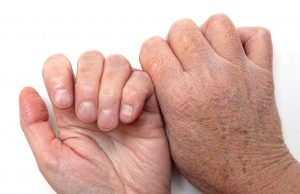Four tips to avoid dry uncomfortable hands this winter
 Do you suffer from dry hands? Well, in New England, this is extremely common. The air in our environment is much less humid; cold outdoor temperatures as well as dry indoor air from our central heating systems both contribute to this. This causes water to evaporate from our skin quickly, making it vulnerable to dehydration. Common symptoms include scaling, redness, irritation and cracking.
Do you suffer from dry hands? Well, in New England, this is extremely common. The air in our environment is much less humid; cold outdoor temperatures as well as dry indoor air from our central heating systems both contribute to this. This causes water to evaporate from our skin quickly, making it vulnerable to dehydration. Common symptoms include scaling, redness, irritation and cracking.
So, how can you best treat and prevent dry hands?
1- Use a gentle cleanser
Soaps can strip oils from the skin. Look for either a mild, fragrance-free soap or a soap-substitute that moisturizes.
2- Do not use hot water
Hot water is more likely to strip your natural skin oils more quickly. Instead use water that is warm.
3- Apply moisturizers after washing
While the skin is still damp, apply a moisturizer to lock in moisture. Thinner hand creams or lotions are more practical and feel more comfortable during the day. At nighttime, use a cream or an ointment such as one containing petrolatum. This will soak in and hydrate your skin overnight.
4- Wear Gloves
Keep your hands warm and protected. Wearing gloves when outside will increase the humidity of the air next to your skin and slow down skin water loss.
If your hands are painful, dry, cracked or bleeding and are not responding to these measures, then book to see a specialist in dermatology. Our experts at SkinCare Physicians are here to provide additional help and advice.
Editor’s note: This blog was originally published on October 18, 2018.
You may also like:
Six easy steps to heal the winter itch



With the support of cream my hand cleared up in the summer but dry cracked skin have come back on my hand…..the creases on my hand bleed.what can I do to stop this? Is it because it’s cold it’s come back? Thank you
There are a variety of reasons that hand dermatitis can flare in the winter. We suggest you have an evaluation with your physician to investigate the possible components.